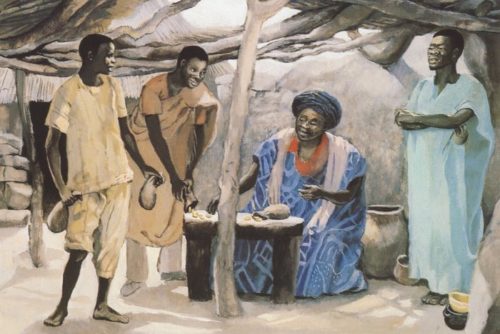For it will be like a man going on a journey, who called his servants and entrusted to them his property.” — Matthew 25:14
Mind. Power. Reality. Soul. Space. Time. With Andy Walsh’s Science in Review: Thor, Thanos and Theology and the commissioning of those entering the next stage of their life in the background, I offer a brief consideration of the Parable of the Three Servants, or, The Talents (Matthew 25:14-30). Note: First post in a series exploring the Parables Jesus Told. [1]

What is the context for the Parable of the Three Servants, or, The Talents?
In Matthew 24 – 25, Jesus prepares his disciples for the future (short and long term). His final teaching in the Gospel of Matthew follows a strong critique of the hypocrisy of the teachers of the law and the Pharisees (Matthew 23). The remainder of Matthew’s Gospel summarizes Jesus’ final hours, the resurrection, and the great commission.
What is the teaching the Parable of the Three Servants, or, The Talents?
As with the Parable of the Ten Virgins (before) and the Teaching of the Sheep and the Goats (after), Jesus calls his disciples to be ready. They have been entrusted with the Lord’s work, the very Kingdom of God. In contrast to the teachers of the law and the Pharisees of his day, Jesus’ disciples are to be faithful with the resources and responsibilities with which they have been entrusted. In the Parable of the Ten Virgins, the love for bridegroom is expressed by a faithful, proper investment / preparedness. Does this involve a capitalistic perspective without a concern for “the least of these”? No, that is quite clear in the pointed Teaching of the Sheep and the Goats.
What is the application of the Parable of the Three Servants, or, The Talents, in our context?
Higher education is filled with the pursuit of mind, power, reality, soul, space, and time.[2] Although Jesus’ parable initially seems like a hard statement on the third servant, it appears that the third servant knew his supervisor reaped where he did not sow and gathered where he scattered no seed. We regularly experience this in higher ed. Imagine “burying” the resources given when one is a significant part of a long term project? How would one’s supervisor respond? How true that when one advances the work, one receives more responsibility / resources.
God yearns for faithful living. Today, let us once again resolve to embrace and embody the two greatest commandments (Matthew 22:34-40, also see the Parable of the Good Samaritan) entrusted to us by our God. May we by God’s grace evidence transformed, accountable, and faithful living. May we live with joyous expectation for the coming of our Lord Jesus. May we become more and more like Christ (individually and corporately as part of the Kingdom of God) where we have been called to serve each and every day.
To God be the glory!
Discussion Questions
- How do you care for that which which you have been entrusted?
- What resource(s) do you sense that you (and those whom you work with) have been called to steward (or entrusted with): mind, power, reality, soul, space, and time?
- How are you (and those whom you work with) tempted to abuse this resource (and others)?
- In what manner do you evidence the love of God and the love of neighbor in your daily living / work?
- How do you find it challenging to love God and love of neighbor in your daily living / work?
- To whom are you extending the Word of life in word, deed, and lifestyle (compassion, grace, gratitude), i.e., inviting to join the Kingdom of God?
- Do you rejoice in the Lord’s blessing / justice toward you and others? Are there ways in which the Lord’s blessing / justice makes one uncomfortable?
Notes
[1] An adaption of a recent adult elective I taught at Elizabethtown Brethren in Christ Church. The title is taken from an excellent resource by David Allan Hubbard: Parables Jesus Told: Pictures of the Kingdom (Downers Grove, IL: InterVarsity Press, 1981). As for the definition of a parable, I appreciate the work of Klyne R. Snodgrass. He writes in Stories with Intent: A Comprehensive Guide to the Parables of Jesus (Grand Rapids, MI: William B. Eerdmans, 2008, 9), “In most cases then a parable is an expanded analogy used to convince and persuade.” I will give consideration to the definition of a parable in future posts.
[2] Maybe their collection is aptly tied together by ego. Yes, I am expecting to see this seventh infinity stone (and the one who comes with it) serving a significant / vital role in next year’s Avengers film.
Tom enjoys daily conversations regarding living out the Biblical Story with his wife Theresa and their four girls, around the block, at Elizabethtown Brethren in Christ Church (where he teaches adult electives and co-leads a small group), among healthcare professionals as the Northeast Regional Director for the Christian Medical & Dental Associations (CMDA), and in higher ed as a volunteer with the Emerging Scholars Network (ESN). For a number of years, the Christian Medical Society / CMDA at Penn State College of Medicine was the hub of his ministry with CMDA. Note: Tom served with InterVarsity Christian Fellowship / USA for 20+ years, including 6+ years as the Associate Director of ESN. He has written for the ESN blog from its launch in August 2008. He has studied Biology (B.S.), Higher Education (M.A.), Spiritual Direction (Certificate), Spiritual Formation (M.A.R.), Ministry to Emerging Generations (D.Min.). To God be the glory!

Leave a Reply